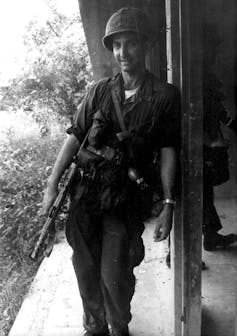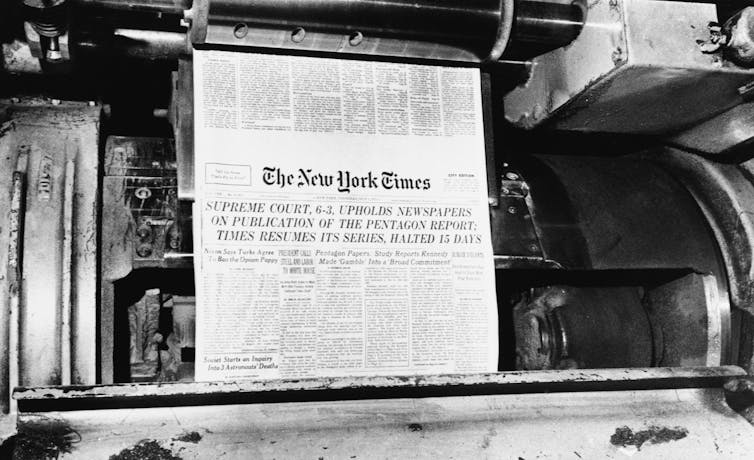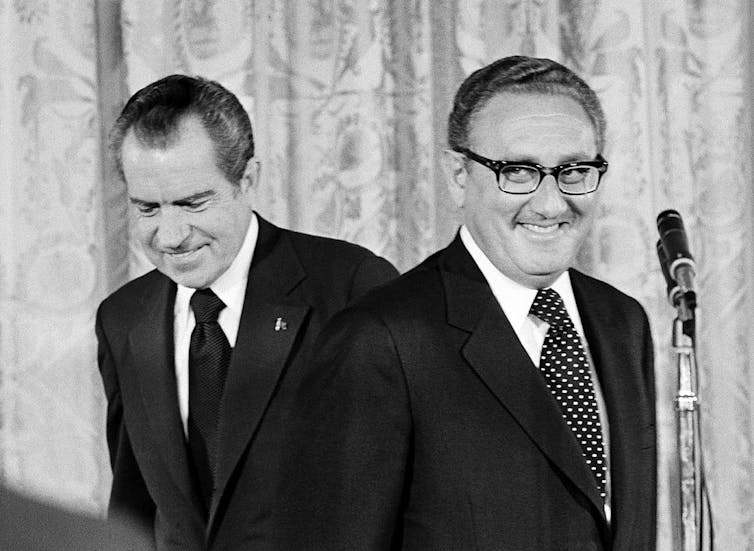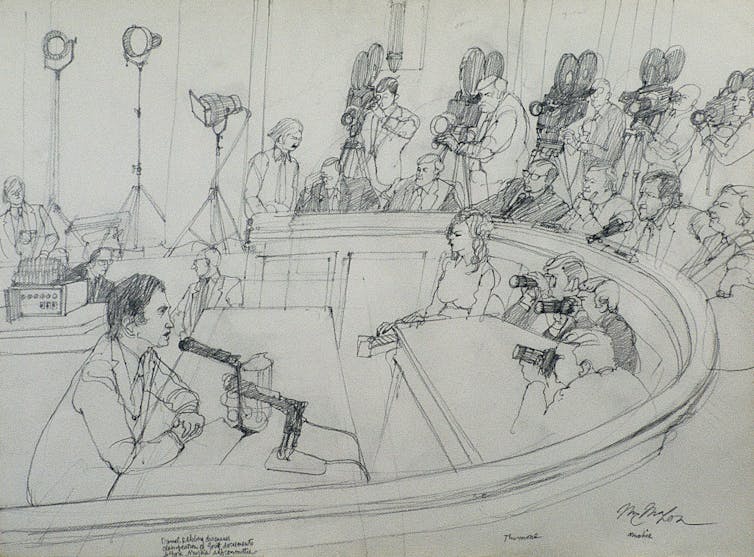How Richard Nixon's obsession with Daniel Ellsberg and the Pentagon Papers sowed the seeds for the president's downfall
- Written by Christian Appy, Professor of History, University of Massachusetts Amherst
When Richard Nixon picked up the Sunday New York Times on June 13, 1971[1], he must have lingered on the smiling image of himself escorting Tricia – his “ethereal blond daughter,” as the paper described her – to her wedding in the White House’s Rose Garden. He was thrilled with the coverage[2].
Then, to the right of the front-page photograph, was a story titled “Vietnam Archive: Pentagon Study Traces 3 Decades of Growing U.S. Involvement[3]” – not exactly an electrifying headline.
That “archive” soon became known as the Pentagon Papers[4] – 7,000 pages of top-secret documents that exposed more than two decades of war-related deceit by four presidential administrations. A major scoop, indeed, but the public might have found it as yawn-worthy as the headline. Later that day, when Defense Secretary Melvin Laird appeared on “Face the Nation,” he didn’t get a single question about it. New York Times reporter Harrison Salisbury’s first thought[5]: “My God, the story is a bust.”
But over the days and weeks ahead, the White House whipped itself into a frenzy of outrage and paranoia over the press and the “treasonous” leaker who released the classified documents: Daniel Ellsberg.
Ellsberg’s significance, in 1971 and now, 50 years later, might have been a lot less had Nixon ignored the Pentagon Papers.
After all, even before they were published most Americans had already turned decisively against the Vietnam War. One poll[6], a month earlier, showed that 71% of Americans believed it had been a mistake, and a remarkable 58% thought it immoral. For many people, the Pentagon Papers simply confirmed, in vast detail, a history of treachery they had long discerned or imagined.
The Pentagon Papers might have slipped as quietly from the news as the 2019 exposure of the Afghanistan Papers[7], which, like their predecessors, revealed that U.S. officials were privately pessimistic about that war even as they told the public and Congress that it was essential and successful.
Instead, Nixon ordered a punitive attack on both the press and Ellsberg – a massive overreaction that kept the Pentagon Papers in the news for two years. More than that, Nixon’s crimes against Ellsberg led directly to the Watergate scandal and the downfall of his presidency.
From Cold Warrior to proponent of peace
Today, many people still know Ellsberg as a famous whistleblower. Yet the details of his story have faded, and many remain unknown, although Ellsberg himself, at 90, remains remarkably sharp and politically engaged.
A series of events[8] sponsored by the University of Massachusetts, Amherst, where I teach history[9], and The GroundTruth Project[10], a nonprofit, grassroots news organization, is focusing new attention on Ellsberg’s life and legacy: a yearlong seminar, the creation of a website, a five-part series of podcasts, and a two-day online conference. All were inspired by UMass’ recent acquisition of Ellsberg’s papers[11] – a treasure trove of some 500 boxes of materials.
 Daniel Ellsberg spent two years in Vietnam.
UMass Amherst Libraries Special Collections & University Archives[12]
Daniel Ellsberg spent two years in Vietnam.
UMass Amherst Libraries Special Collections & University Archives[12]
Ellsberg’s decision to release the Pentagon Papers was the result of his profound transformation from war planner to peace activist, one of the most dramatic conversion stories in American history.
Once a fervent Cold Warrior, Ellsberg joined the Marine Corps in the mid-1950s, earned his doctorate in economics from Harvard and, starting in 1959, worked on nuclear war policies for the Rand Corp., a think tank funded mostly by the Air Force. In 1964 he was one of the “whiz kids”[13] recruited to work for Defense Secretary Robert McNamara[14]. There his focus shifted to the Vietnam War, which he viewed as a just cause.
But after spending two years in Vietnam, from 1965 to 1967, Ellsberg concluded the war was an unwinnable stalemate from which the United States should seek a face-saving exit. Over the next two years his criticism of the war went far deeper. He came to see it[15] not only as a mistaken intervention, but as an American war of aggression – unjust, immoral, even criminal.
Risking it all
That radical conclusion was based, in part, on a close reading of the Pentagon Papers – a study McNamara had commissioned and which Ellsberg had helped compile. It made shockingly clear to him that the United States had never been on the side of democracy and self-determination in Vietnam. Instead, the nation had acted as a counterrevolutionary imperial power.
Ellsberg was also deeply inspired by anti-war activists who were taking great risks to oppose the war[16], particularly the thousands of young men who were willing to serve prison sentences for their resistance to the draft. After hearing one of them, Randy Kehler, speak at a War Resisters League conference in August 1969, Ellsberg asked himself[17] what he might do to help end the war.
Would he be willing to risk his career – even his freedom?
A month later, Ellsberg began making photocopies of the Pentagon Papers. He gave them to anti-war senators William Fulbright[18] and George McGovern[19], hoping they might put the documents into the public record and hold hearings to expose how Nixon was continuing his predecessors’ pattern of lying about the war’s expansion.
No one in Congress had the political courage to release the papers.
Finally, in March 1971, Ellsberg took them to Neil Sheehan at The New York Times[20].
Three months later, the paper of record ran the story.
The White House thrums with paranoia
At first, Nixon seemed unalarmed.
After all, the Pentagon history spanned the years from 1945 to early 1968, ending a year before Nixon took office. Many of the most damning revelations concerned the presidencies of Democrats John F. Kennedy and Lyndon B. Johnson.
Nixon’s first impulse, as he told an aide, was to call the Pentagon Papers a “fight within the Democratic Party[21]” that “we are not going to get into.”
So what changed? Why did Nixon ultimately decide to go after the press and Ellsberg?
The main reason: a fear that Ellsberg or someone else might leak more documents, ones that would expose Nixon’s secret, and potentially impeachable, actions and plans.
When national security adviser Henry Kissinger raised this specter, Nixon immediately expressed his worry[22] that Ellsberg might have evidence of his secret bombing of Cambodia. Even worse, Ellsberg might leak evidence that Nixon had tried to sabotage peace talks with Vietnam just before his 1968 election[23].
Ellsberg had no such documents, but White House officials practically competed to gin up the vitriol and panic. One result was that Ellsberg and the Pentagon Papers remained front-page news long after they were first revealed.
The counteroffensive begins
Nixon’s first step was to attack the press so severely that all news outlets would be deeply hesitant to publish leaked material. And so, for the first time in history, the federal government issued prior restraint injunctions to stop the presses[24] – to prevent The New York Times and other papers from publishing any more of the Pentagon Papers.
Yet, in a striking show of media defiance, 19 U.S. papers published[25] portions of the Pentagon Papers. Their decision was given legal sanction by a Supreme Court decision just two weeks after the first injunction[26].
 The New York Times resumed publication of its series of articles based on the Pentagon Papers on July 1, 1971, after it was given a green light by the U.S. Supreme Court.
AP Photo/Jim Wells[27]
The New York Times resumed publication of its series of articles based on the Pentagon Papers on July 1, 1971, after it was given a green light by the U.S. Supreme Court.
AP Photo/Jim Wells[27]
The second step was to go after Ellsberg. The government indicted him under the Espionage Act[28], not for leaking secret documents to a foreign agent, but for giving them to the press and public. That, too, was unprecedented.
But Nixon and his advisers quickly concluded that trying Ellsberg in the courts was hardly sufficient. He had to be destroyed.
Ellsberg “is the most dangerous man in America[29],” Kissinger ranted. By the end of June 1971, Nixon’s rage peaked. In multiple meetings he berated aides to “destroy” that “son-of-a bitch” and “I don’t care how you do it.”
“You can’t drop it,” he said to his chief of staff, H.R. Haldeman[30]. “You can’t let the Jew steal that stuff and get away with it. You understand?”
 National security adviser Henry Kissinger warned President Nixon that Daniel Ellsberg was ‘the most dangerous man in America.’
David Hume Kennerly/Getty Images[31]
National security adviser Henry Kissinger warned President Nixon that Daniel Ellsberg was ‘the most dangerous man in America.’
David Hume Kennerly/Getty Images[31]
Nixon repeatedly made clear that legality was irrelevant. “Use any means. Is that clear?” He approved the formation of a “Special Investigations Unit,” soon dubbed “The Plumbers[32],” because their job was to fix leaks. Priority one: silence Ellsberg.
The main crime committed against Ellsberg, overseen by ex-FBI and CIA agents G. Gordon Liddy[33] and E. Howard Hunt[34], was to burglarize his psychiatrist’s office to search for damning information. They found nothing.
The bungled operation was a dress rehearsal for their even more botched break-ins at Democratic National Committee headquarters at the Watergate office complex nine months later.
Crimes against Ellsberg unveiled
After his indictment in 1971 on a dozen felony counts with a possible sentence of 115 years, Daniel Ellsberg was an anti-war celebrity and a household name. For good reason. No government official with his level of access to power and to classified information had ever broken so radically with the nation’s military policies and taken such a big personal risk in seeking to change those policies.
Also indicted was Anthony Russo[35], a friend and former Rand Corp. colleague who encouraged Ellsberg to copy the Pentagon Papers. They were tried together in California beginning in early 1973, just as the first Watergate trials where getting underway.
 Daniel Ellsberg’s trial coincided with the first Watergate trials.
Franklin McMahon/Corbis via Getty Images[36]
Daniel Ellsberg’s trial coincided with the first Watergate trials.
Franklin McMahon/Corbis via Getty Images[36]
In mid-April 1973, near the end of Ellsberg’s trial, Watergate prosecutors discovered the illegal campaign against Ellsberg[37] – including, along with the burglary of his psychiatrist’s office, warrantless wiretaps and CIA-conducted psychological profiles, which went against the CIA’s charter. These first Watergate crimes linked directly to the White House. Within days, Nixon, desperate to save his presidency, fired four of his top aides[38].
When the judge received notification of these crimes against Ellsberg, he had no choice but to dismiss the case.
The blowback
Because Nixon was directly implicated in forming the Plumbers and attacking Ellsberg, I can’t help but ask a striking “what if”: Had Nixon not overreacted to the Pentagon Papers, would Watergate have happened? And even if it did, would Nixon have been forced to resign?
There is still no evidence that Nixon authorized the break-in at the Watergate. The hush money Nixon paid the Plumbers[39] was intended to keep them from talking about the crimes against Ellsberg as much as the Watergate break-in.
The scandal may also have had a significant impact on the Vietnam War. According to historian Larry Berman, in his 2001 book “No Peace, No Honor[40],” Nixon intended to renew bombing South Vietnam after the Paris Peace Accords of January 1973 if the Saigon government was in peril. By April 1973, plans for that bombing had advanced. However, at just that moment the Watergate scandal was erupting and Nixon’s political strength was unraveling.
“There is no question,” Berman concluded, “that Watergate sapped any resolve that Nixon may have had to bomb again.” Desperate to cling to power, he could not afford the political fallout reentering the war would cause. By June 1973, Congress was emboldened to pass an amendment prohibiting further U.S. military activity in Indochina, and Nixon lacked the political support to veto it.
You can’t replay history, so it’s impossible to know if Nixon’s presidency would have survived had the Plumbers not been formed to attack Ellsberg. Nor is it certain that Nixon would have prolonged the Vietnam War if he were not besieged by Watergate.
But clearly the attacks on Ellsberg institutionalized a pattern of illegal action against perceived political enemies[41] that led directly to Nixon’s downfall – and with that, the certainty that the war in Vietnam would finally end.
References
- ^ the Sunday New York Times on June 13, 1971 (timesmachine.nytimes.com)
- ^ He was thrilled with the coverage (nsarchive2.gwu.edu)
- ^ Vietnam Archive: Pentagon Study Traces 3 Decades of Growing U.S. Involvement (miro.medium.com)
- ^ Pentagon Papers (www.archives.gov)
- ^ Harrison Salisbury’s first thought (books.google.com)
- ^ One poll (www.lawrenceproberts.com)
- ^ the 2019 exposure of the Afghanistan Papers (www.washingtonpost.com)
- ^ A series of events (www.ellsbergpapers.org)
- ^ where I teach history (www.umass.edu)
- ^ The GroundTruth Project (thegroundtruthproject.org)
- ^ UMass’ recent acquisition of Ellsberg’s papers (www.umass.edu)
- ^ UMass Amherst Libraries Special Collections & University Archives (scua.library.umass.edu)
- ^ “whiz kids” (slate.com)
- ^ Robert McNamara (www.nytimes.com)
- ^ He came to see it (www.penguinrandomhouse.com)
- ^ great risks to oppose the war (uncpress.org)
- ^ Ellsberg asked himself (www.penguinrandomhouse.com)
- ^ William Fulbright (www.pri.org)
- ^ George McGovern (www.npr.org)
- ^ Ellsberg took them to Neil Sheehan at The New York Times (www.nytimes.com)
- ^ fight within the Democratic Party (prde.upress.virginia.edu)
- ^ expressed his worry (www.salon.com)
- ^ Nixon had tried to sabotage peace talks with Vietnam just before his 1968 election (www.nytimes.com)
- ^ the federal government issued prior restraint injunctions to stop the presses (law2.umkc.edu)
- ^ 19 U.S. papers published (www.pbs.org)
- ^ just two weeks after the first injunction (www.mtsu.edu)
- ^ AP Photo/Jim Wells (newsroom.ap.org)
- ^ under the Espionage Act (prospect.org)
- ^ is the most dangerous man in America (www.npr.org)
- ^ he said to his chief of staff, H.R. Haldeman (www.washingtonpost.com)
- ^ David Hume Kennerly/Getty Images (www.gettyimages.com)
- ^ The Plumbers (www.nytimes.com)
- ^ G. Gordon Liddy (www.washingtonpost.com)
- ^ E. Howard Hunt (www.nytimes.com)
- ^ Anthony Russo (www.nytimes.com)
- ^ Franklin McMahon/Corbis via Getty Images (www.gettyimages.com)
- ^ illegal campaign against Ellsberg (www.washingtonpost.com)
- ^ fired four of his top aides (www.washingtonpost.com)
- ^ The hush money Nixon paid the Plumbers (www.vox.com)
- ^ No Peace, No Honor (www.simonandschuster.com)
- ^ perceived political enemies (www.businessinsider.com)
Authors: Christian Appy, Professor of History, University of Massachusetts Amherst

